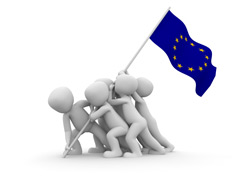 Manuel Barroso suggests banking reform and believes Europe’s economic woes are nearly over, whilst European shares approach three year high.
Manuel Barroso suggests banking reform and believes Europe’s economic woes are nearly over, whilst European shares approach three year high.
Manuel Barroso, the president of the European Commission, has delivered a ‘state of the union speech’ in Strasbourg this morning. Manuel Barroso’s speech came after grave predictions that Greece will need further help at least once and possibly twice, according to European Central Bank Governing Council member Luc Coene, who stated this morning;
[quote]”It’s clear that we are not yet at the end of the Greek problem. We will need to make further efforts, certainly once, perhaps twice more. We will see how the situation develops.”[/quote]
The highlights of Barroso’s statement included suggestions of a banking reform to deliver a single supervisory mechanism. The key objective of which would be to prevent citizens of a country ‘bailing out’ failed financial institutions such as banks. In future shareholders and bond holders would have to save banks by way of rights issues and or bail-ins.
With a nod in the direction of America Barroso referred to Lehman brothers and reminded the assembled audience (of mainly MEPs) that the financial crisis began five years ago with the collapse of Lehman Brothers. This triggered a financial crisis, and an unprecedented social crisis in Europe. This crisis is still “holding back our households and companies”.
Europe needs to avoid a jobless recovery, declared Barroso, he avoided the point that the eurozone’s relentless austerity programmes are blamed for causing the unemployment crisis. The EC president declared that; “The current level of unemployment is economically unsustainable, politically untenable and socially unacceptable.”
Barroso Conclusion
Manuel Barroso concluded his speech by setting out two distinct priorities. Firstly, getting final agreement on the next EU budget – the Multi annual Financial Framework. This caused clashes in 2012 as country leaders such as David Cameron and Angela Merkel attacked Brussels planned rise in funding. Secondly, implementing banking union in the eurozone.
[quote]”This progress is essential to deliver growth, and to fight unemployment – especially youth unemployment. That is our priority, the crisis is not over, it is in its decisive phase”. [/quote]
Market snapshot at 10:00 am UK time
Asian shares continued their nine/ten day rally in the overnight/early morning session , however, the gains were marginal, whilst European equity markets have also increased marginally. The Nikkei index closed up 0.01%, the Hang Seng down 0.17% and the CSI up 0.32%. The ASX 200 closed up 0.64% in Australia on the back of an Australian consumer confidence survey printing at a three year high.
In Europe markets have reacted cautiously to Barroso’s speech; the DAX is up 0.43%, the latest year on year inflation figure for German coming in at 1.5%. In France the CAC is down 0.16%, the latest employment figures falling by 0.2%. The UK FTSE is down 0.15% as UK unemployment falls by 0.1%, whilst the ASE is down 0.34% and the Istanbul exchange down 0.20%.
ICE WTI oil is up 0.27% at $107.68 per barrel, NYMEX natural is up 0.06% per therm, COMEX gold is up 0.15% at $1366.10 per ounce as silver is up 0.36% on COMEX.
Looking towards the New York open the DJIA equity index future is currently, at the time of writing, flat, whilst the SPX 500 is down marginally by 0.03% and the NASDAQ down 0.18%.
Forex in focus
Sterling rose less than 0.1 percent to 84.29 pence per euro Early in the London session after appreciating to 83.92 pence on Sept 6th, the strongest level seen since Jan 24th. Sterling was little changed at $1.5745 after rising to $1.5749, the highest level seen since June 17th. Sterling approached its seven-month high versus the euro before the government report that economists correctly predicted would show U.K. jobless claims declined in August. The pound has risen 7.3 percent in the past six months, the best performer of the ten developed-nation currencies tracked by the Bloomberg Correlation-Weighted Indexes. The dollar has gained 1.2 percent whilst the euro has advanced by 3 percent.
Australia’s dollar slid 0.1 percent to 92.99 U.S. cents in the Sydney session from yesterday, when it reached 93.19, a level not seen since July 24th. The currency was little changed at 93.26 yen from 93.48 yesterday, when it spiked by 1.7 percent. New Zealand’s dollar fell 0.2 percent to 80.56 U.S. cents from yesterday, when it touched 80.76, the strongest level seen since Aug 19th. The kiwi dollar declined 0.2 percent to 80.87 yen.
The dollar rose 0.1 percent to $1.3261 per euro early in the London session after declining by 1.1 percent during the previous three days. The U.S. currency was little changed at 100.34 yen. Yen climbed 0.1 percent to 133.08 per euro after depreciating to 133.38, the weakest level seen since May 22nd.





